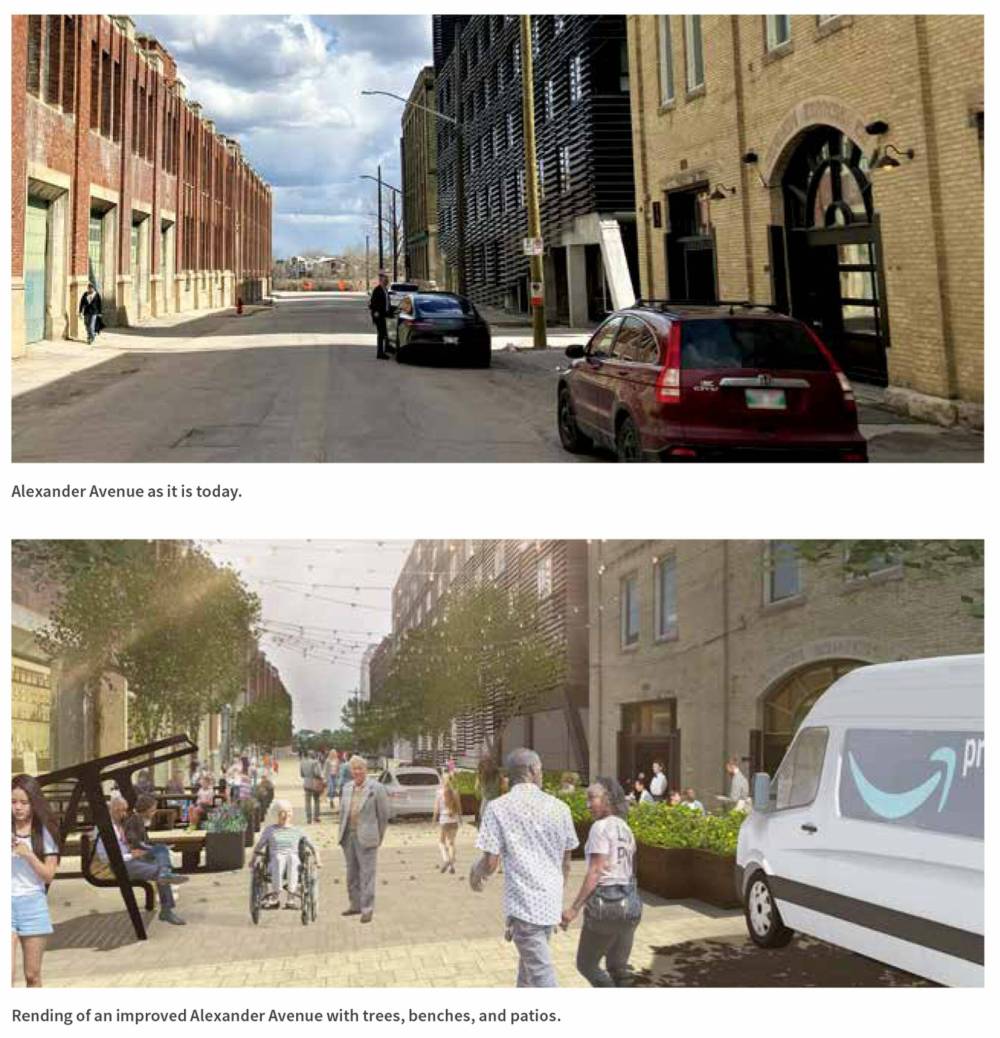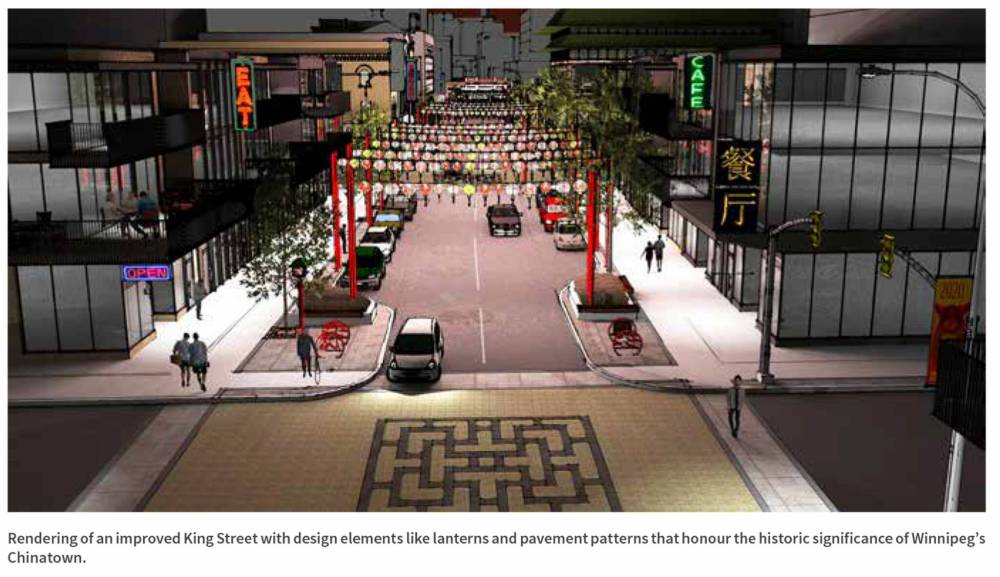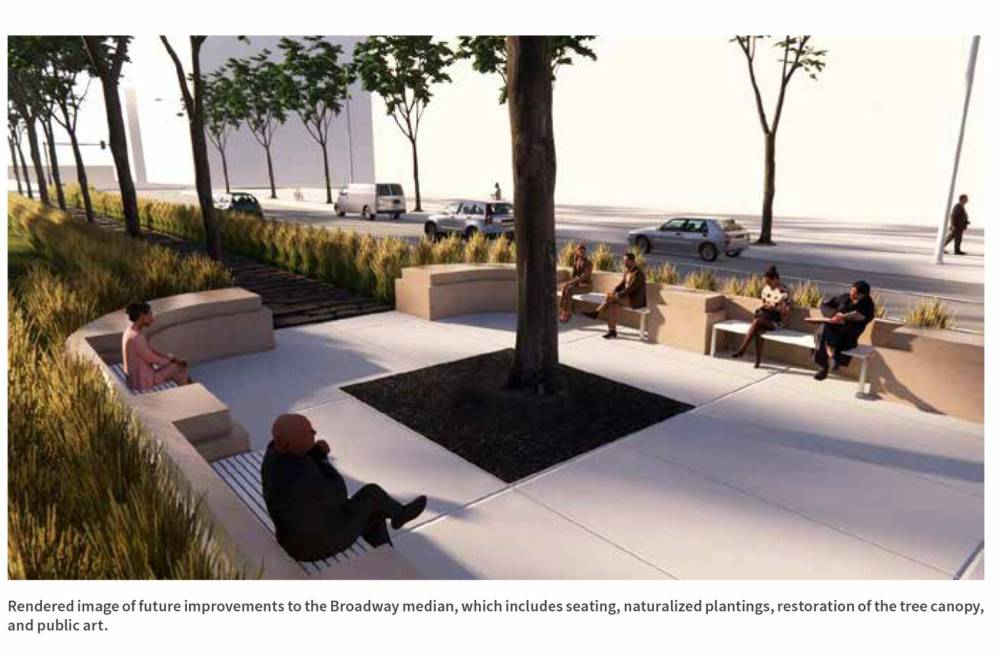A downtown restaurateur who supports long-term plans to revitalize the core believes addressing the general perception that the area is unsafe must be a priority for the city.
Phil Klein, who owns Bagelsmith at 185 Carlton St., said the CentrePlan 2050 proposal to add new green space, calm traffic, reimagine Graham Avenue and attract hundreds of new residents clearly outlines what the city centre needs.
The problem, he said, is downtown’s mostly unfair reputation as a dangerous place.
“(That vision reflects) everything… that everyone’s been saying for 30 years about downtown,” he said. “I would love to see all those things happen but, if I’m being a realist, I don’t see most of it happening.

CITY OF WINNIPEG CentrePlan 2050
“You have to change people’s perceptions of downtown before any of this stuff is going to be successful.”
Klein said he’s committed to his Carlton Street location and believes the area is safe for customers and workers during business hours, despite the ever-present challenges of homelessness, mental-health concerns and addiction issues.
There have been a few break-ins at the store, he said, adding since downtown traffic hasn’t fully recovered to pre-pandemic levels, businesses also need help to thrive.
“I think there needs to be some kind of a subsidy or a monetary benefit for people that actually take an initiative… to open a business downtown,” he said.

CITY OF WINNIPEG CentrePlan 2050
On July 18, city council is scheduled to vote on a recommendation to approve CentrePlan 2050 as an official secondary plan for Winnipeg’s downtown.
Council will also consider devoting millions of dollars to implement the plan in next year’s budget process: up to $250,000 for a pilot project to “animate” Graham Avenue next year; up to $1.5 million to design and construct longer-term Graham Avenue improvements; up to $2.25 million in each of 2025, 2026 and 2027 to waive/reimburse some fees for downtown residential development; up to $250,000 to create a safety and maintenance plan for Thunderbird House; and $46,000 to support major neighbourhood cleanup events.
CentrePlan also sets a target to ensure at least 350 new residential units get built in the city centre each year until 2030, followed by 500 per year after that.

CITY OF WINNIPEG CentrePlan 2050
Brianna Solberg, prairie director for the Canadian Federation of Independent Businesses, said attracting more residents downtown is “crucial” for small businesses, due to soaring inflation and reduced spending.
“(Businesses are) seeing increased costs and decreased revenues, and so it’s creating kind of a perfect storm,” said Solberg.
However, she said crime and safety issues are a pressing concern.
“We’ve heard from businesses, ‘What is the point in me having a physical location or storefront when it is actually my biggest headache? All my costs have increased, plus I’m vulnerable to these threats of theft (and) vandalism,’” said Solberg.
A recent Downtown Winnipeg BIZ report notes 27 new businesses opened downtown last year and 37 closed, which Solberg said reflects that struggle.

CITY OF WINNIPEG CentrePlan 2050
Lanny McInnes, president of the Manitoba Home Builders’ Association, said the “ambitious” housing goals are possible, though the city must ensure existing pipes and other infrastructure can support denser developments.
“That is going to be a key component to this downtown plan being successful,” he said.
If the secondary plan is approved, city will seek a tri-level funding deal with the provincial and federal governments to help implement long-term changes, while also co-ordinating efforts to add housing.
Winnipeg South Liberal MP Terry Duguid said downtown revitalization and downtown housing are critical priorities the federal government supports but can’t consider funding the plan until a request is made.
“I think we have to see the specifics but I think there is support in our caucus for that direction,” he said.
Duguid noted redevelopment plans for Portage Place and The Bay as initial steps toward rejuvenating the city centre.
“I think with governments working together with community organizations, Indigenous organizations, with business, we are going to make a big difference to the downtown,” he said.
Manitoba Municipal Relations Minister Ian Bushie said his government is also open to considering a funding deal.
“There (are) a lot of things that are very exciting to be able to entice downtown to (make) it more green and more livable…. Public safety is a key aspect of that, as well…. We’re open to having a discussion and to kind of thinking outside the box, in some cases, as to how we can best revitalize the downtown area,” said Bushie.
Coun. Jeff Browaty, city council’s finance chairman, said he agrees CentrePlan sets ambitious goals but believes the city can make progress toward them.
“Just getting more people engaged and coming downtown, I think, will help…. (Prior to COVID) things were getting better… people were spending more time around the clock downtown,” he said.
Pending city council approval, the plan would guide downtown development over the next 30 years.
joyanne.pursaga@freepress.mb.ca
X: @joyanne_pursaga

Joyanne Pursaga
Reporter
Joyanne is city hall reporter for the Winnipeg Free Press. A reporter since 2004, she began covering politics exclusively in 2012, writing on city hall and the Manitoba Legislature for the Winnipeg Sun before joining the Free Press in early 2020. Read more about Joyanne.
Every piece of reporting Joyanne produces is reviewed by an editing team before it is posted online or published in print — part of the Free Press‘s tradition, since 1872, of producing reliable independent journalism. Read more about Free Press’s history and mandate, and learn how our newsroom operates.
Our newsroom depends on a growing audience of readers to power our journalism. If you are not a paid reader, please consider becoming a subscriber.
Our newsroom depends on its audience of readers to power our journalism. Thank you for your support.